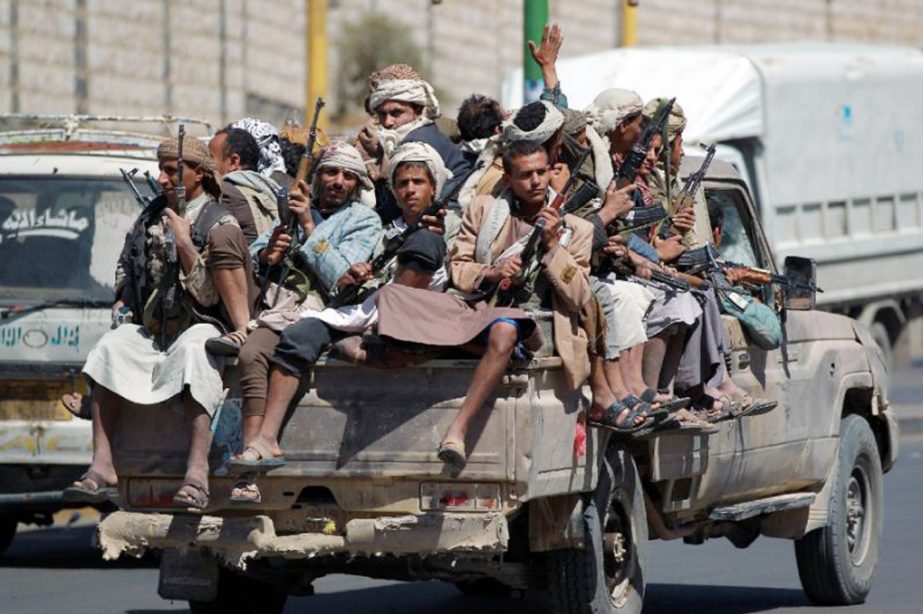
AFP, Dubai :
A rift in Yemen’s rebel camp has opened the door for Saudi Arabia to mediate in a conflict that has claimed thousands of lives, the International Crisis Group said Wednesday.
Compounded by poverty, cholera and looming mass starvation, the Yemen war has claimed more than 8,500 lives since Saudi Arabia and its allies joined the government’s fight against the Iran-backed Huthi rebel alliance in 2015.
In a report, ICG said Saudi Arabia and its allies-including the US and Britain-should move fast to “capitalise on a division that they have encouraged”.
It said they should turn the political rift between Yemeni strongman Ali Abdullah Saleh and his Huthi allies into a ceasefire and ensure the rebels cut all ties with Shiite Iran.
“The timing is ripe but the opportunity easily could slip away,” ICG said.
While both parties in the Yemen war have been criticised for neglecting to protect civilians, the Saudi-led coalition has come under particularly harsh criticism for the deaths of civilians in air raids.
The United Nations now plans to send war crimes investigators to Yemen, despite strong resistance from Saudi Arabia.
For decades, Riyadh backed former president Saleh, who ruled Yemen from its unification in 1990 until he resigned under pressure in 2012, ceding power to his vice-president Abedrabbo Mansour Hadi.
But in 2014, Saleh aligned himself with the Huthis, against whom he had fought six wars when he was president. The two now jointly control Yemen’s northern highlands and the capital Sanaa.
In August, rumoured tensions between Saleh and rebel chief Abdulmalik al-Huthi exploded in public, with the ex-president slamming his allies as militias and the Huthis openly threatening “backstabbers”.
Ties between Saleh and Huthi remain tense.
Meanwhile, the U.N. special envoy for Yemen accused the country’s warring leaders on Tuesday of refusing to end the fighting and liberate the people “from the scourge of famine and conflict” because they stand to lose wealth and power.
With the civil war entering its fourth year and heavy fighting continuing, Ismail Ould Cheikh Ahmed warned that “the situation will continue worsening as well as the terrorist threat” if the parties don’t listen to the people and display flexibility.
“In Yemen there are no winners on the battlefield,” he told the U.N. Security Council. “The Yemeni people – they become poorer whereas the leaders become richer. … They are not interested in finding solutions, as they will lose their power and control in a settlement.”
According to John Ging, the U.N.’s director of humanitarian operations, some 15 million Yemenis lack adequate access to clean water and health services, 7 million face the threat of famine and 460,000 children are severely malnourished. Cholera has killed more than 2,100 and there are over 800,000 suspected cases, which he called the largest single-year outbreak on record.
A rift in Yemen’s rebel camp has opened the door for Saudi Arabia to mediate in a conflict that has claimed thousands of lives, the International Crisis Group said Wednesday.
Compounded by poverty, cholera and looming mass starvation, the Yemen war has claimed more than 8,500 lives since Saudi Arabia and its allies joined the government’s fight against the Iran-backed Huthi rebel alliance in 2015.
In a report, ICG said Saudi Arabia and its allies-including the US and Britain-should move fast to “capitalise on a division that they have encouraged”.
It said they should turn the political rift between Yemeni strongman Ali Abdullah Saleh and his Huthi allies into a ceasefire and ensure the rebels cut all ties with Shiite Iran.
“The timing is ripe but the opportunity easily could slip away,” ICG said.
While both parties in the Yemen war have been criticised for neglecting to protect civilians, the Saudi-led coalition has come under particularly harsh criticism for the deaths of civilians in air raids.
The United Nations now plans to send war crimes investigators to Yemen, despite strong resistance from Saudi Arabia.
For decades, Riyadh backed former president Saleh, who ruled Yemen from its unification in 1990 until he resigned under pressure in 2012, ceding power to his vice-president Abedrabbo Mansour Hadi.
But in 2014, Saleh aligned himself with the Huthis, against whom he had fought six wars when he was president. The two now jointly control Yemen’s northern highlands and the capital Sanaa.
In August, rumoured tensions between Saleh and rebel chief Abdulmalik al-Huthi exploded in public, with the ex-president slamming his allies as militias and the Huthis openly threatening “backstabbers”.
Ties between Saleh and Huthi remain tense.
Meanwhile, the U.N. special envoy for Yemen accused the country’s warring leaders on Tuesday of refusing to end the fighting and liberate the people “from the scourge of famine and conflict” because they stand to lose wealth and power.
With the civil war entering its fourth year and heavy fighting continuing, Ismail Ould Cheikh Ahmed warned that “the situation will continue worsening as well as the terrorist threat” if the parties don’t listen to the people and display flexibility.
“In Yemen there are no winners on the battlefield,” he told the U.N. Security Council. “The Yemeni people – they become poorer whereas the leaders become richer. … They are not interested in finding solutions, as they will lose their power and control in a settlement.”
According to John Ging, the U.N.’s director of humanitarian operations, some 15 million Yemenis lack adequate access to clean water and health services, 7 million face the threat of famine and 460,000 children are severely malnourished. Cholera has killed more than 2,100 and there are over 800,000 suspected cases, which he called the largest single-year outbreak on record.

